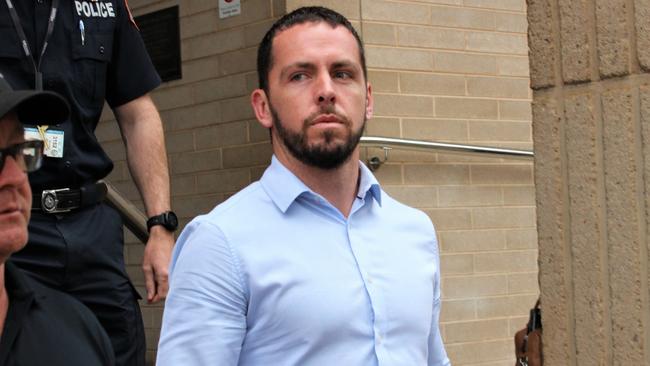Zach Rolfe’s lawyer’s argue right to refuse questions at Kumanjayi Walker inquest is ‘a human right’
Chief Justice Michael Grant asked if Zach Rolfe’s dismissal affected his appeal, but was told there was still ‘a discretionary question for the coroner down the track’.

Police & Courts
Don't miss out on the headlines from Police & Courts. Followed categories will be added to My News.
Zach Rolfe’s refusal to answer questions about the night he killed Kumanjayi Walker is akin to a “human right” relating to “the dignity of the individual”, a court has heard.
In refusing to answer questions last year at an inquest into Mr Walker’s death, Mr Rolfe invoked a legal “penalty privilege” against incriminating himself in internal NT Police disciplinary proceedings.
Coroner Elisabeth Armitage had ruled he could be compelled to answer the questions under the protection of an immunity certificate, but that ruling remains the subject of an ongoing appeal in the Supreme Court.
On Tuesday, Mr Rolfe’s barrister Ben Doyle KC said the penalty privilege, like the right against self-incrimination in a criminal offence, was “a quite fundamental principle”.
“While, of course, in our jurisprudence we wouldn’t describe it as a human right, it is reflective of a right or legal value that is attributed to natural persons and that’s part of the reason why it’s found not to be available to corporations,” he said.
“That says something about its character, if it was just purely adjectival, for convenience or as a matter of good procedure or evidence, it wouldn’t discriminate, but it has a relationship to the dignity of the individual.”
In response, barrister for Attorney-General Chansey Paech, Tim Game SC, said if Mr Doyle’s interpretation of the law was right a person could “get whatever they’ve got to say into the privilege against penalty”.
“So in this particular case, (Mr) Rolfe is pushing that principle as hard as he can because he’s declined to answer any questions at all about the events that occurred on the day of the shooting,” he said.
Mr Game said if a witness’s objection could not be brought within the relevant section of the Coroners Act “then you’ve got to answer the questions”.
“So the appellant’s true position is that the appellant needs to bring himself within section 38, and that was what the Coroner decided and that’s what we say is the correct construction of these provisions,” he said.
“This case, in our respectful submission, involves a very short and very straightforward point and that’s it.”
Mr Rolfe was acquitted on all charges by a Supreme Court jury in March last year and was subsequently dismissed by NT Police after he released a lengthy public statement earlier this year.
Chief Justice Michael Grant asked if any of the lawyers would be submitting that “this appeal is no longer competent because of the appellant’s termination from the police force”, but Mr Game said there would still be “a discretionary question for the coroner down the track.”
The hearing is expected to conclude on Tuesday afternoon with the court’s decision likely to be reserved.





